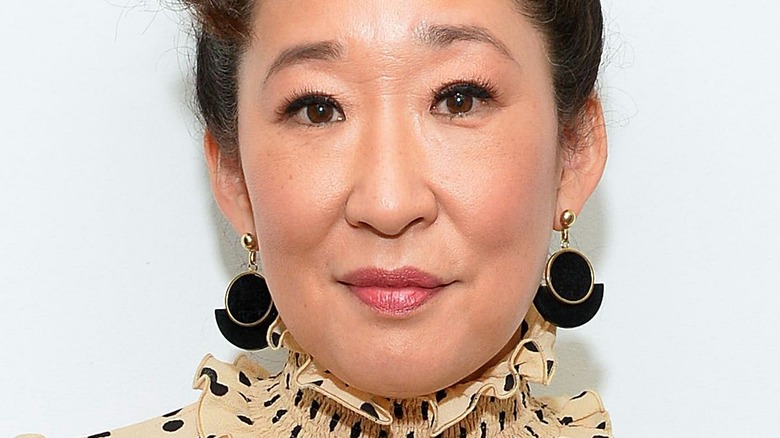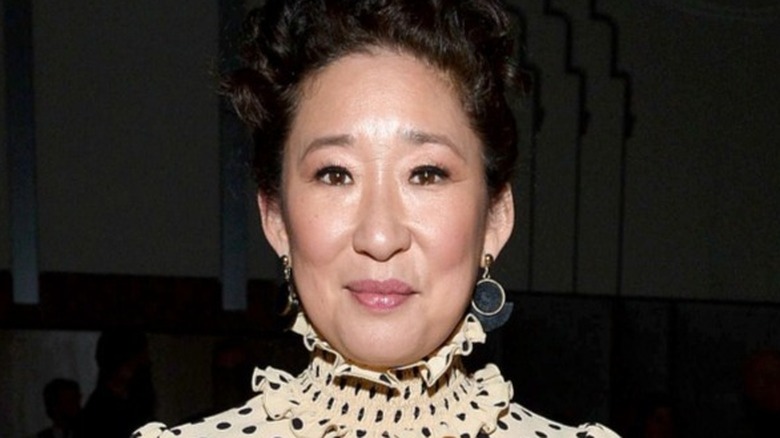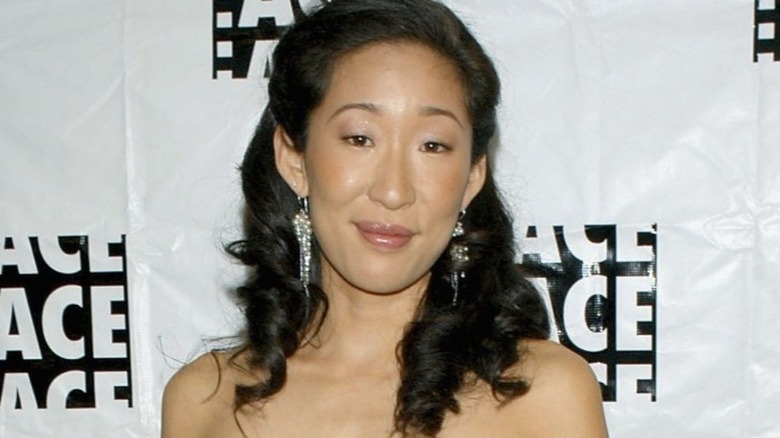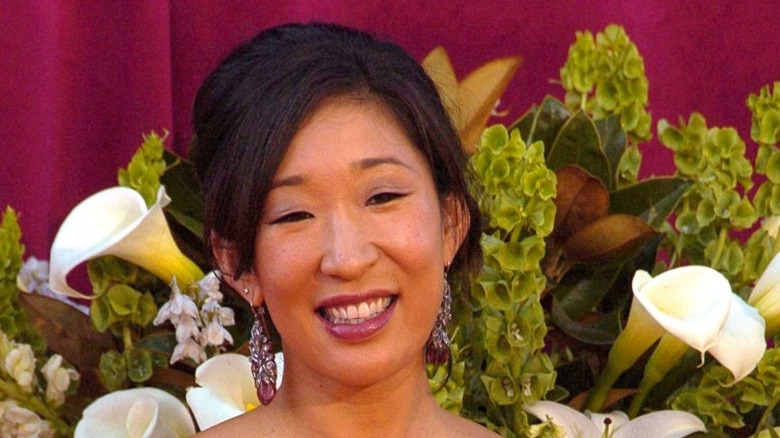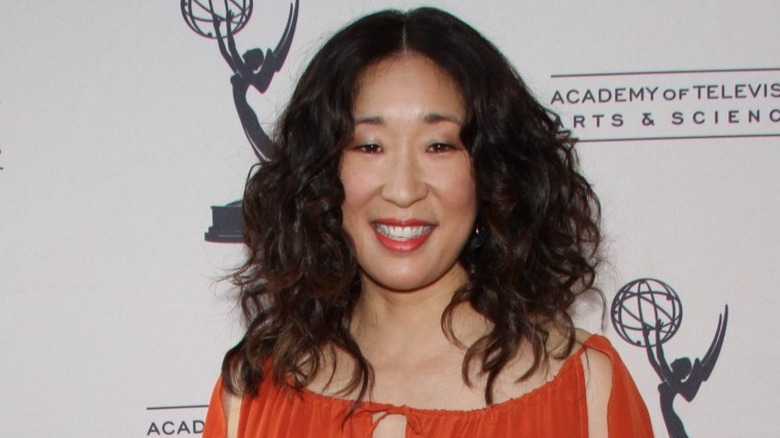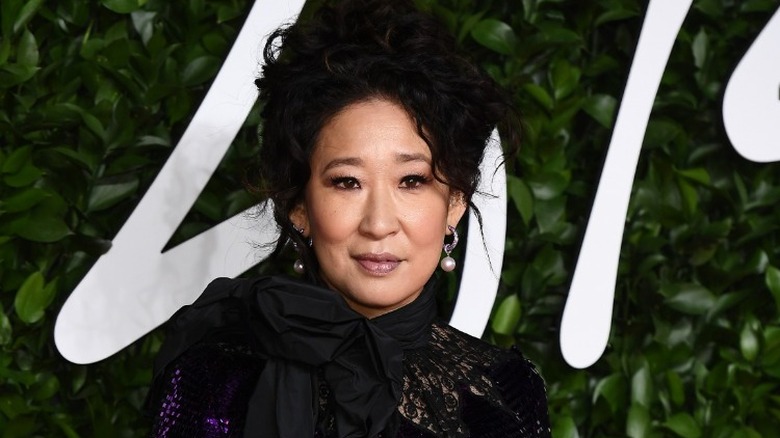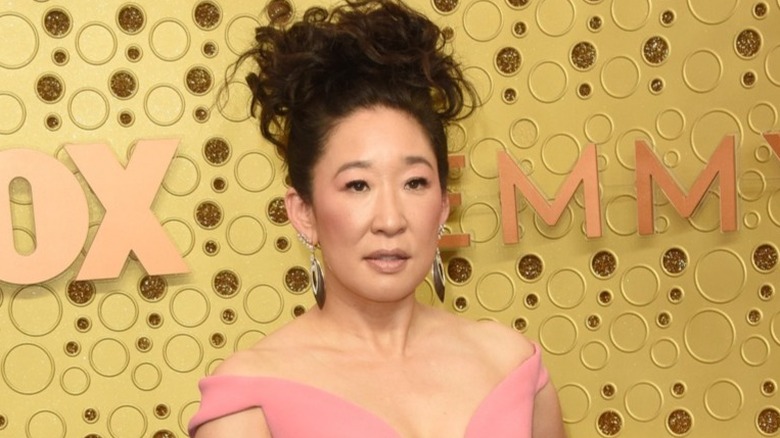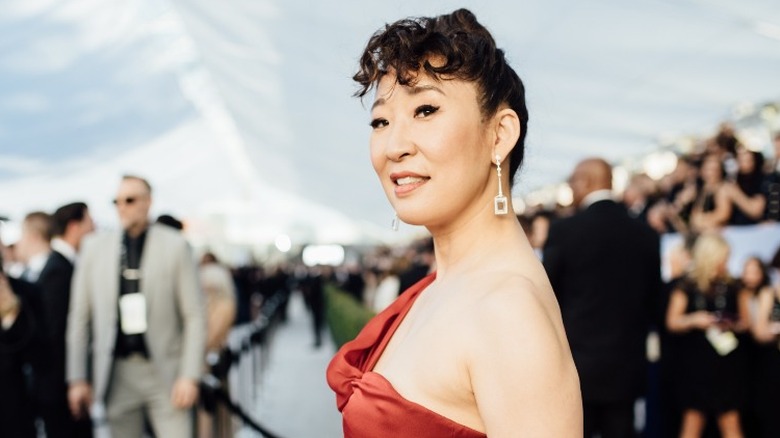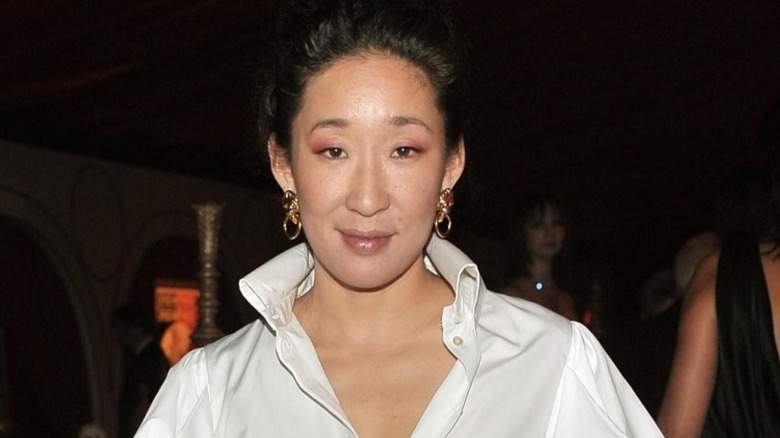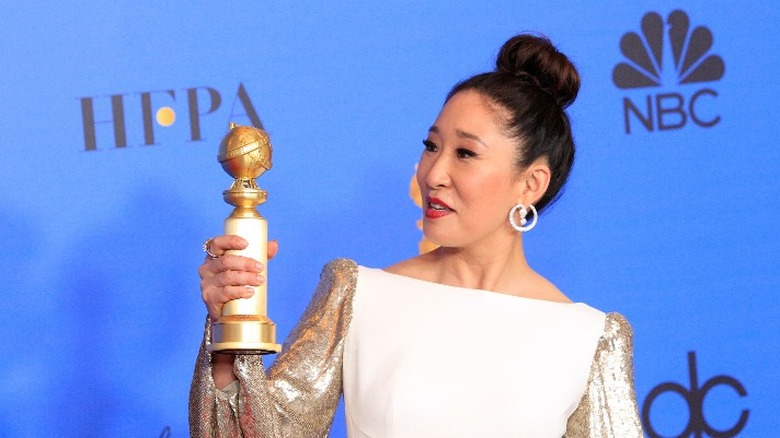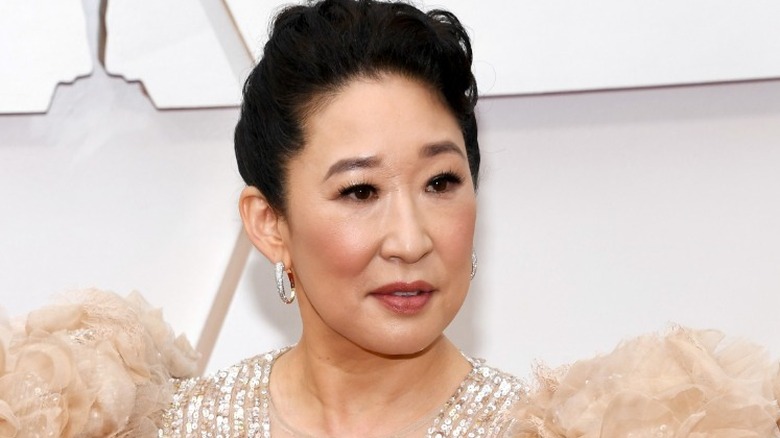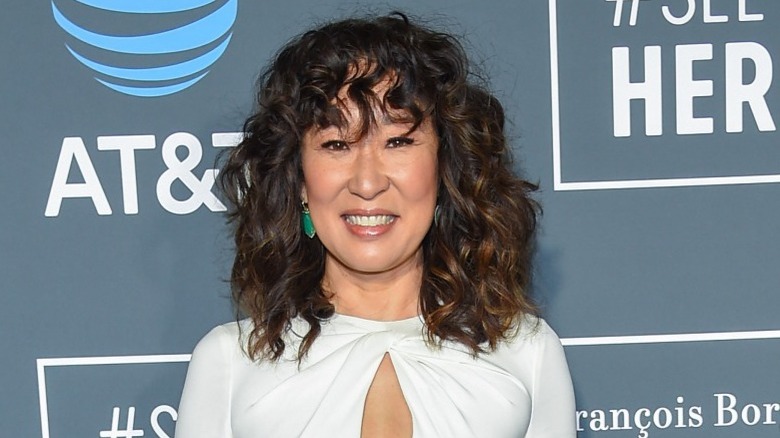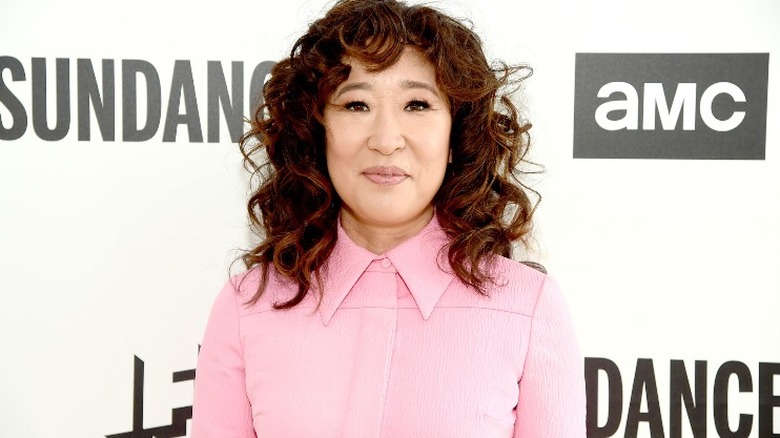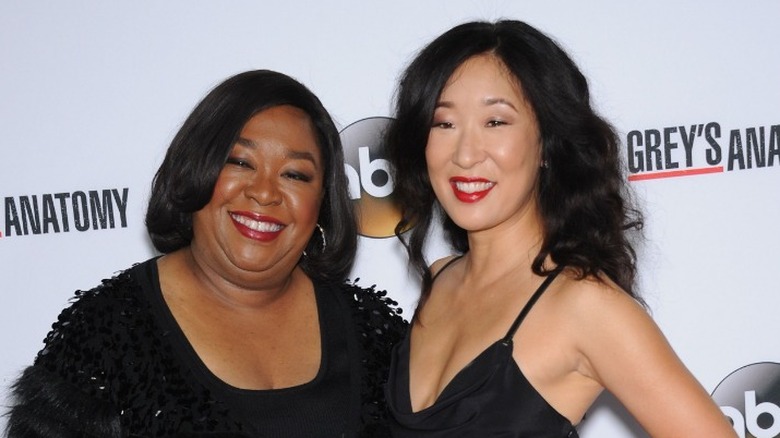Things Sandra Oh Fans Might Not Know About The Actress
Between Cristina Yang on "Grey's Anatomy" and Eve Polastri on "Killing Eve," Sandra Oh has played some of the most memorable women who've ever graced the small screen. More recently, she starred as department chair Ji-Yoon Kim in Netflix's "The Chair." It's just one more fantastic performance from a cherished actress who lives her life largely out of the public eye.
Oh got her start in Canadian film and television before moving to Los Angeles in the mid-1990s, starring in titles like the Oscar-nominated "Sideways." But in 2005, she became a household name when "Grey's Anatomy" took over the universe, and she's continued to take on interesting, dynamic roles since leaving the show in 2014. Though she's not a fame-chaser, Oh has done enough press that we've gotten a peek at who she is, where she comes from, and what she cares about –- all of which paints a fascinating picture of Oh as an enlightened, determined, passionate thespian. Here are some things that Sandra Oh fans might not know about the actress.
Religion has played a huge part in her life
Sandra Oh is one of Canada's national treasures – she has a star on the Canada Walk of Fame and a key to the capital city of Ottawa –- and she has an equally immense amount of pride for her home country. Oh has discussed her roots in many interviews, how she grew up in the Ottawa-area suburb of Nepean, now a part of Ottawa, in a typical immigrant family. Her parents married in Seoul, South Korea, and emigrated to Canada in the 1960s, where they worked as a businessman and a biochemist, respectively.
Oh's early life was very much wrapped up in religion, and much of the family's time was spent at church. "Wherever Koreans are, they set up a church," she told Marie Claire. "There weren't many of us, maybe 10 families, so this was like a church in the basement of a church." Along with her older sister and younger brother, Oh went to a church camp, and it's there that she learned many of her early lessons. "We would go to English-speaking church in the morning, and then we would go to Korean church in the afternoon," she explained in an NPR interview. "I spent a lot of time in church! I'm so grateful for it now. I don't consider myself Christian now, but it has such a huge influence on me." She went on to say that her early Christian socialization allows her to connect with her very religious parents, and that it's helped her as an artist and human.
Sandra Oh was one talented kid
Oh once told The Gentlewoman Magazine that she experienced "a very, very typical Korean upbringing –- lots of church, lots of golf," so it makes sense that her life was very scheduled in her early years. There was an emphasis on structure, which meant school was very important, as were extra-curricular activities such as piano lessons and dance class.
Oh's parents put her in dance classes when she was 4, believing it would fix her pigeon toes, and she loved being on stage more than they could have ever anticipated. Around 11 or 12, she realized ballet wasn't what she was meant to do and switched to acting. She acted throughout her time at Sir Robert Borden High School, both in plays and at the Canadian Improv Games, and began working professionally at age 15.
Piano was another large part of Oh's early creative life. Unlike dance, Oh wasn't a fan of the instrument, and she was resistant to the lessons her parents forced upon her. In a Netflix interview with the band the Linda Lindas, Oh admitted that she hated piano practice so much that she would record herself playing and try to trick her parents into thinking she was rehearsing. "And my mom, who would be in the kitchen, would just think I was, like, practicing, and I would just play the recording," she said.
She went to theater school despite her parents' misgivings
As she was growing up, Oh's parents put pressure on her and her siblings to focus on education and a predetermined list of careers. "They didn't see that there was any meaning to being an actor," Oh told Marie Claire. "It was like, 'What are you doing for society?' ... They wanted their children to become doctors or lawyers." And while Oh's siblings did become a lawyer and a medical geneticist, she knew that wasn't her path in life.
When Oh enrolled at the National Theatre School of Canada, it was a difficult thing for her parents to accept. But by the time she found her first big break — beating out 1,000 others for the lead in "The Diary of Evelyn Lau" at age 19 — her parents were reluctantly supportive, even though she was playing a sex worker. As she explained to Net-A-Porter, "It aired, and the next week at church, some people were not [supportive]. But I never felt any pressure because [my parents sided with me], and that was clearly very difficult. ... It's amazing the ways we feel understood by our parents."
Not only have Oh's parents since come around to her career choice, but they're active fans. They were with her when she won a Golden Globe in 2019 — she bowed to them as a sign of respect and strength — and they've taken to proudly posing in front of her billboards for all of Instagram to see. "Koreans are ambitious, man," she told Vanity Fair. "It means a lot to my parents that I do the world that I do and it has the visibility."
Canada vs. Hollywood
When she was starting out as a young actress in Canada, Oh's Asian appearance actually helped her land roles in well-reviewed projects like "The Diary of Evelyn Lau" and "Double Happiness." As she once told The Hollywood Reporter, "In Canada, it's very, very different because multiculturalism is very much mandated, so I really, really benefited from that during my teen years because there needed to be representation."
However, her initial success didn't follow her to Hollywood. In one painful experience, an American agent told Oh she would have no shot at success in the United States and that she should go back home. It only took a year for Oh to land a supporting role on HBO's "Arli$$," though even that part relegated her to the sidelines.
"First of all, in Canada, someone like me can be a star, a leading lady. In the U.S., much more difficult," Oh told TV Fanatic in 2007. "They always want to keep you in the supporting roles. ... Before anything, before I open my mouth or express something of the character I am playing, you are seeing an Asian woman, a woman of Korean descent." Lucky for us, Oh has gotten to a stage in her career where she's being given roles worthy of her brilliance –- and fighting for representation for other actors of color as well.
She almost played a different part on Grey's Anatomy
It's incredibly difficult to imagine any other actress as Cristina Yang — the acerbic, brilliant surgeon that Oh played on "Grey's Anatomy" for 10 seasons. And it's just as difficult to picture Oh as Dr. Miranda Bailey, the part she was originally asked to play. And yet, that's how things almost shook out until Oh told producers she had no desire to play Dr. Bailey and asked to audition for Cristina instead.
She was drawn to the role for a number of reasons, including that Cristina was "the antagonist" in the show. "I found her interesting. I found her prickly. I found her having a lot of the qualities that I don't particularly feel like I have," Oh said to Vanity Fair. "I just was also at a point where I did not want to play a character of authority. I was more interested in the role of the students."
Even though she knew she wanted to play Cristina, Oh was encouraged by her manager to fight for her worth, which almost meant leaving it all on the table. In a 2019 In Style interview, Oh explained that as she came in to test for the part, her agent called her on the phone with an intense message. "She said, 'They won't sign your deal. Leave. Walk out.' And I was just like, 'Ah, okay.' It was a real exercise in learning how to say no. I left, and then they called me." And let us just say, thank God that they did!
Sandra Oh struggled with the Grey's Anatomy fame
Oh is known for keeping a lower profile than a lot of celebrities, and so it makes sense that the immense popularity of "Grey's Anatomy" may have hit her hard. Recently, she's opened up about her meteoric rise and the experience of fame. "To be perfectly honest, it was traumatic," she told Willie Geist on "Sunday Today," adding, "When one loses one's anonymity, you have to build skills to still try and be real."
In the interview with Geist, Oh discussed how the lack of privacy was difficult for her and how therapy was imperative in her learning to live in a fishbowl. "I went from not being able to go out, like, hiding in restaurants, to then being able to manage attention, manage expectation, while not losing the sense of self," she said, while also noting her need for boundaries. "You just have to work at finding your way to stay grounded. And a lot of times that's by saying no."
She said no to a lot of projects after Grey's Anatomy
Fame allowed Oh the opportunity to pick and choose her next project after "Grey's Anatomy," which meant saying no to a lot of things that weren't the right fit. This meant four years where she didn't take on another leading television role, which is something she's reflected upon in interviews. "The four years of actively waiting by doing the things that I love ... it was my choice to do three plays. It was my choice to do American Crime, you know?" she said to Vanity Fair. "Actually being able to exercise your own choice can bring about greater opportunity. I think it's just as important what you say no to as what you say yes to."
Oh sees the ability to turn down projects and shaping her own route as a privilege she's earned by working for as long as she has. "It takes a while to get to a point in your career where you can actually make a choice, and after a decade of my life on a show, I had enough economic power to say no," she told The Sun. ""Those four years, it was like active waiting. I was not not working. I was figuring out what it is to say no and what it is to say yes." When "Killing Eve" came along, the actress says it just felt right.
She was confused about Killing Eve
The role of Eve Polastri is one that most actresses would kill for –- a smart but deeply flawed secret agent who's obsessed with the serial killer she's chasing. But even though Oh loved the script for "Killing Eve," she originally had trouble finding where she fit. As Oh told a Vulture reporter, she was reading the screenplay, and feeling confused, she called up her agent, saying, "I don't understand, what's the part? And [my agent] goes, 'Sweetheart, it's Eve, it's Eve.' In that moment, I did not assume the offer was for Eve. I think about that moment a lot."
Even after her agent told her that she was being asked to play Eve, Oh had trouble seeing herself in the part –- not because she couldn't do it but because she was so rarely given the opportunity to play the lead. "I just couldn't see it. I couldn't see myself in a leading role," she told Marie Claire UK, adding, "To catch myself in a moment where I'm not [doubting myself] is still really difficult.'"
Oh attributes the confusion to her own internalized ideas about race, which had been cultivated throughout her life but especially during her time in Hollywood. As she explained to Vulture, "It's like, how does racism define your work? Oh my goodness, I didn't even assume when being offered something that I would be one of the central storytellers. ... After being told to see things a certain way for decades, you realize, 'Oh my god! They brainwashed me!'"
She's set records for Asians in Hollywood
Oh knows what it is like to struggle as a racial minority in Hollywood. Perhaps this is why she feels so connected to others who've experienced the same prejudices she has. In a 2019 Net-A-Porter interview, she discussed conversations she had been having with other prominent Asian thespians, such as Daniel Day Kim and Ming-Na Wen. "There is just this bond [between us]," she said, "we're the first generation."
Still, there's a ways to go in terms of Asian representation in Hollywood, and Oh knows that she has a role to play in the fight for space. "I look up to the African-American creative community because of the way they have created a sense of individual and [collective] identity," Oh told Net-A-Porter. "It's almost too early for us in the Asian community. It just speaks to where I feel we need to go."
That said, because of Oh, it's possible that the next generation of Asian actors will have it easier. She has, after all, broken a number of records for Asians in Hollywood. For example, she was the first Asian woman to ever be nominated for a lead actress Emmy (for "Killing Eve"), the first Asian woman to win multiple Golden Globes, and when she nabbed her 2019 Golden Globe for Best Actress in a TV Drama, she became the first Asian woman in 39 years to win that particular award.
She's taking on roles that explore the topic of race
Eve Polastri is a fantastic character, but she was never meant to be Asian –- in the novels that the series is based upon, the character is white and British, not Asian-American. Therefore, it's not really surprising that Season 1 and 2 of "Killing Eve" had little focus on Eve's race. However, Season 3 saw Eve working in a Korean restaurant, and it's a storyline that Oh pushed for. "For me, it was like she should be around the language, the sounds, the smells, the food," Oh once told Esquire.
And with "The Chair," Oh was immediately drawn to how much the character's ethnic background factored into the script. Her character is the first woman of color to chair her department –- the English department at the fictional Pembroke University -– and her race is a key part of the story. "I was ecstatic when Amanda Peet gave me this script and I had a Korean name," Oh told the Los Angeles Times, adding, "To have a Korean name is very important, just in the way of normalizing things. It's nice to be able to hear a name that you might not be familiar with, but all the other characters are saying my name and saying my name correctly."
In other words, representation is incredibly important to Oh. As she explained to the Los Angeles Times, "'Killing Eve,' regarding that subject matter, is a real transitional piece for me. I am now only interested in pieces that are specifically dealing with Asian experiences. Not in a heavy-handed way, but in a way that considers it."
Sandra Oh hosted the Golden Globes because it scared her
In 2019, Oh co-hosted the Golden Globe Awards alongside Andy Samberg, making Oh the first Asian person –- not woman, but person –- to host the Golden Globes in its entire 78-year history. "I said yes to the fear of being on this stage tonight to look out onto this audience and witness this moment of change," she said during the show. "And I'm not fooling myself. ... Next year could be different, but right now this moment is real. Trust me, it's real. Because I see you and I see you, all these faces of change. And now, so will everyone else."
Even though she seemingly enjoyed hosting enough –- "'I had so much stress and tension about it, but by the end of Sunday night, I was exhilarated" she told Marie Claire UK –- in the future, Oh plans to stick to winning the awards rather than hosting them. In fact, she's proclaimed that she will never, ever host again. "That dude (Samberg) is the best. He is such a great guy," she said in an interview with UPROXX. "I would do anything that he would ask me to do, but I wouldn't host another award show."
She's childless by choice
Like all actresses of a certain age, Oh has had to weather the motherhood question time and time again in interviews. Despite the fact that it's no one else's business, Oh has occasionally opened up about her decision to remain child-free. "It was like, do you want to be a single mom while you're working on the show?' Because I was still working on 'Grey's.' Do you want to have that life?," she told The Gentlewoman. "It's actually a gift that there is a timeline, that there is an actual physical timeline. Because your body is going to change, you have to deal with reality. And to deal with the reality, you have to know what you want and who you are."
Oh rarely discusses her romantic life, but she's sometimes spotted out and about with her boyfriend, photographer Lev Rukhin. And even though the couple don't have kids of their own, Oh finds happiness in spending time with the kids already in her life. "I have an extremely fulfilling life as an aunt, not only to my nieces and nephews but also to a lot of my friends' children," she once told Marie Claire UK.
Sandra Oh won't be returning to Grey's Anatomy
Given that "Grey's Anatomy" is still on the air, it shouldn't surprise anyone that Oh is frequently asked about an eventual return to the series. In recent interviews, she's made it clear that viewers shouldn't hold their breath. "I left that show, my god, seven years ago almost. So in my mind, it's gone," she said on the Los Angeles Times' "Asian Enough" podcast. "But for a lot of people, it's still very much alive. And while I understand and I love it, I have moved on."
But even though she's moved on, Oh still cherishes her time on "Grey's." Even though Oh would reportedly fight with writers over what she saw as best for her character (via Variety), "Grey's Anatomy" creator Shonda Rhimes was seemingly fine with it. Oh and Rhimes were pictured together as recently as February 2020, and Rhimes has only said wonderful things about Oh in interviews. "I grieved [no longer] writing for Sandra more than anything because I [wouldn't] get to see what she would do with it," Rhimes told Elle Canada. "I think she chooses characters and then inserts herself into them. There are plenty of actors who want to be nice or who want to be seen as romantic or who want to be seen as a hero, but Sandra's not interested in that. She's interested in playing the stuff of life."
